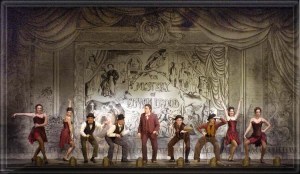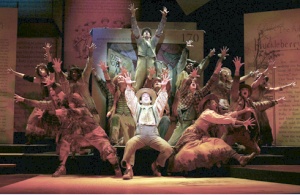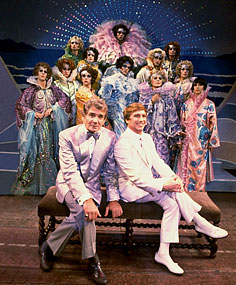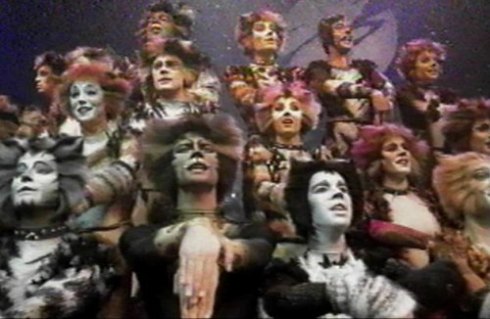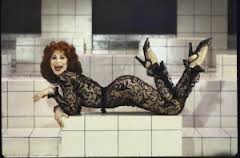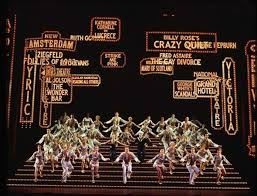
One thing that you’ll hear a lot with discussing 42nd Street is how it’s the end of an era. David Merrick was one of the last big producers on Broadway, and this was his last effort to bring an old style Broadway show like it used to be.
Never trust anybody who claims to be putting on a show the way Broadway “used to be.” And most especially don’t trust David Merrick who probably wrote all this copy himself. David Merrick was a combination of Jack Warner and a publicity hound who would stop at nothing to not only have his shows succeed but become cultural phenomenons. He was not very nice, not many people liked him, but damn–the man got stuff done yo. No, 42nd Street has nothing to do with Broadway in the days of yore–and more has to do with the upcoming flavor of musicals in the 80’s and 90s–this is the rise of the mega-musical.
Now, I’m not claiming that this is the first mega-musical exactly, there have been many shows before this that have had long runs, but this is the first show that I know of that was intentionally trying to have a long run–before 42nd street a show lasting more than one season was (generally) considered a success. Now we’ve got shows (hello Spiderman!) that have to run for at least 5 years before earning a dime. So instead of my normal review, I’m going to lay out all the aspects of the mega-musical, and how 42nd street fills the bill.
1. An expectation of a long run.
2. Big sets, big casts, big big big–the idea is to overwhelm the audience, which leads to…
3. An emphasis on pageantry rather than storytelling.
4. A conversation piece happening that bring people out of the show talking about to build word of mouth. Here it’s the huge cast of tap-dancers practically overflowing from the stage, but a more famous one would be the chandelier in Phantom of the Opera.
5. Broad Characters–42nd street has a bunch of characters we already know–the up and coming star, the jaded old star that’s on her way out, the tricky producers, the director who’s committed to his art, mobsters, stage-door johnnies, the love interest with a heart of gold. You are told exactly who to root for from the very beginning.
6. Simple plot–The good people are good, the bad people are bad. At the end everyone gets their deserved reward.
7. Songs that are set-pieces rather than pushing forward the story–this is a 180 degree turn from the direction that Broadway shows have been generally developing since the 40’s.
8. Family-friendliness–While not kiddie fare, 42nd street is primarily an unthreatening landscape–there’s no attempt to connect the actions on the stage to the real world whatsoever. No current events please.
9. Connection to a subject that people are familiar with, but is not canonized. 42nd Street is perfect because it’s familiar, you know all the songs already, but the story isn’t one where its fans would start saying but in the original movie she didn’t do that….
10. Emphasis away from its central stars. Mega-musicals could have a star in them if it was convenient, but mostly they shied away from that–they wanted the sort of show that you could endlessly replace people and the audience wouldn’t really care. In fact, this sort of musical actively resisted having an individual actor place their stamp on it too heavily.
11. An easily recognizable theme. Here I mean more like a dress up party theme than anything else. Here we have the 30’s, bright lights, chlorines, pork-pie hats, tap-dancing, sparkly outfits, coat and cane, the whole nine yards.
You probably can tell I’m not a big fan of this sort of show. Yes, they’re impressive, but they run so slickly, so like a well oiled machine, they more remind me of a carnival ride than a show that really gets to you. You’re supposed to watch these with your brains firmly off, and your wonderment scanners on high. The reason I don’t really review this show is there’s nothing here to really review. It’s very professionally done, but it’s not really all that interesting (to me), in fact the production values here completely erase all the edges and interesting parts this story originally had. The whole point of it is to make something as familiar and unchallenging as possible so that the widest possible audience would pour in. And boy did they.
However, as a harbinger of things to come, this show was extremely accurate and thus deserved the Tony.
Tags: 42nd Street, Broadway Musicals, David Merrick, Tony Awards
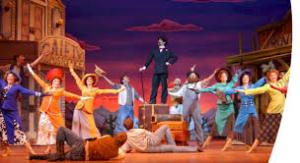 So, Crazy for You was the big winner for best musical of 1992. It’s a western based on Gershwin’s music, and it’s….kinda everything you’d expect. It starred Jodi Benson, the voice of the Little Mermaid, and I couldn’t fault the Tonys for giving the award to this one. Then again, it’s so thoroughly unsurprising that it’s an uninspired choice in a way.
So, Crazy for You was the big winner for best musical of 1992. It’s a western based on Gershwin’s music, and it’s….kinda everything you’d expect. It starred Jodi Benson, the voice of the Little Mermaid, and I couldn’t fault the Tonys for giving the award to this one. Then again, it’s so thoroughly unsurprising that it’s an uninspired choice in a way.